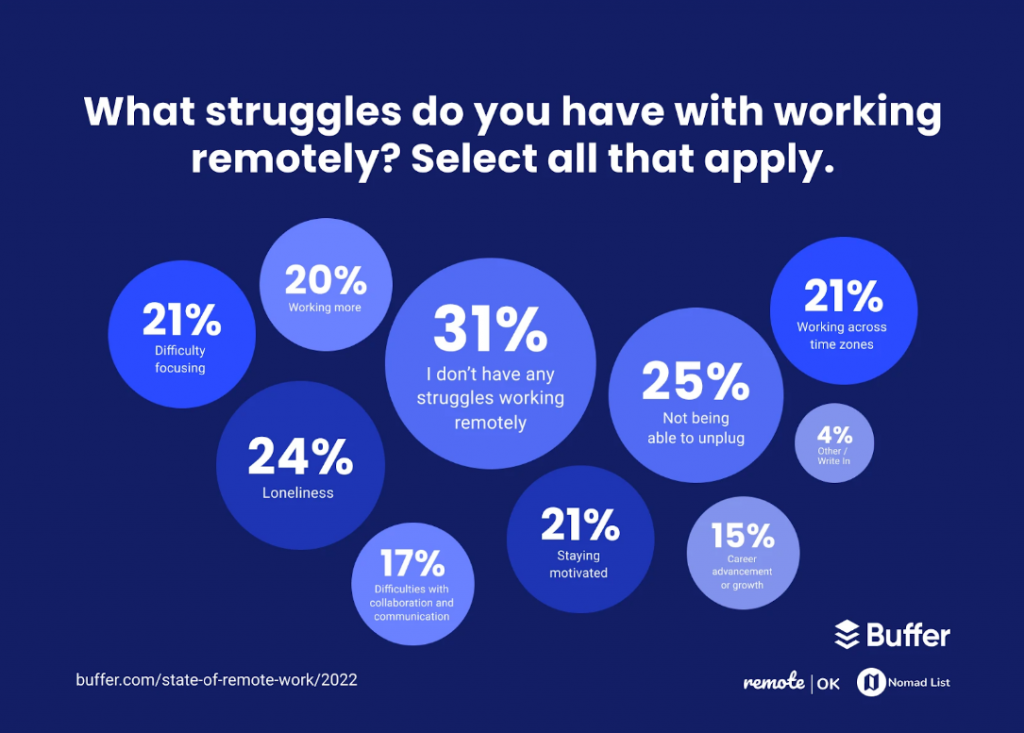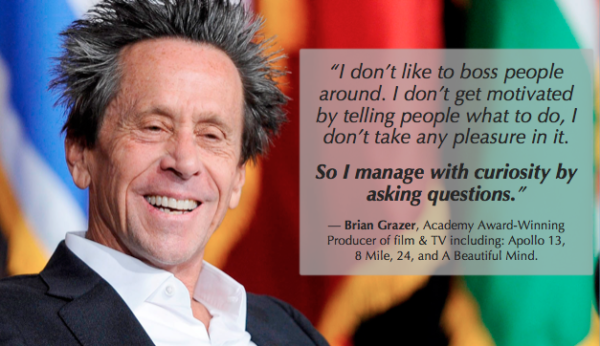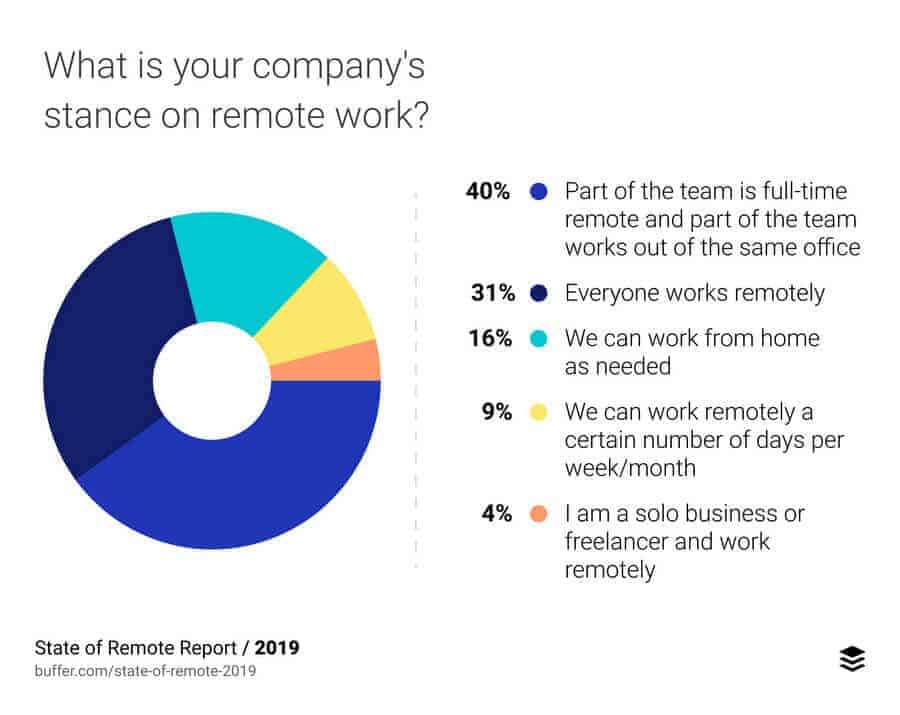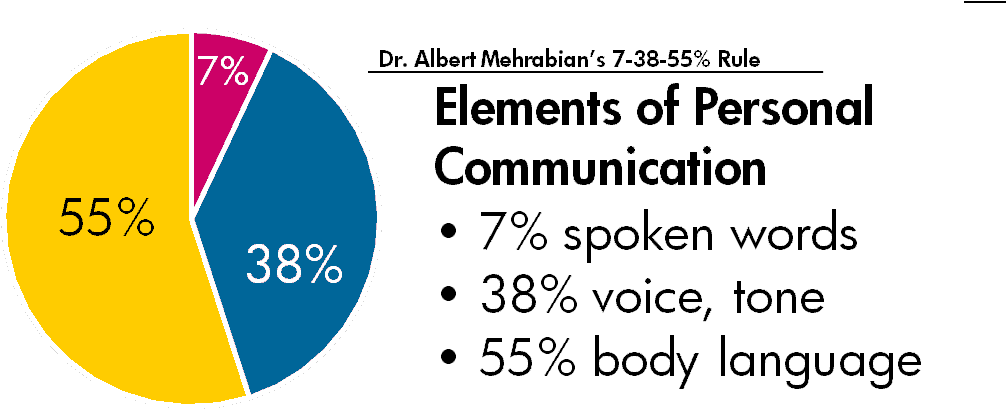Supporting remote employees is different, and in some ways harder, than employees in the office. But the right questions during your 1 on 1s can go a long way to helping them thrive. Read on to learn specifically crafted questions to ask remote employees on your team.
Remote management is the same as managing people in an office with you, right?
Not quite. According to Buffer's State of Remote Work report, remote employees face many unique challenges:

‘Not being able to unplug’ is at the top of people’s concerns for the second year in a row. Burnout, isolation, and distractions are still a part of being away from the office.
As a manager, it can be hard to understand what your remote workers are going through, especially if you're only seeing them in Zoom calls. This can make your remote team members feel isolated in more ways than one.
Remote employees are separated from the rest of the office, so it's easy for them to feel out of the loop of normal office communication that happens organically.
However, that's not the only difference. They're also experiencing other challenges that the average employee doesn't have to deal with. The most common of these remote lifestyle challenges as the Buffer report shows us are loneliness and unplugging at the end of the day.
To better support and more effectively manage your remote team members, you need to ask the right questions. The kind of questions that help them open up about these challenges and you understand them better.
Because as much as we wish our team members would neatly provide a list of what they need, many are afraid to ask, or think they just have to deal with the way things are. Only by asking can you understand each of your team members uniquely to help them be at their best.
Table of Contents

45 Remote Work Questions to Ask Employees to Better Support them
Asking the right questions can unlock insights that help you break through issues and better support your team. That's why we want to share some great questions you can use today to uniquely understand and support your remote employees.
The key is focusing on the specific challenges of working remotely. Your team may not volunteer information about these issues, but addressing them can improve their work life and the performance of your team as a whole.
Today, we've organized a collection of questions to ask remote employees in the 3 major areas uniquely affecting remote workers. This includes:
45 Questions to ask remote employees to better support them:
Within each section, we've provided context to help you understand the purpose of the questions and how they allow you to help remote workers facing those particular challenges.
Starting things off, here are 45 one on one questions to ask remote employees.

Use Remote Lifestyle questions to ensure they’re set up for success
According to a 2018 report by Global Workplace Analytics, the remote workforce "has grown by 140% since 2005” and is still growing rapidly. In 2021, Owl Labs has reported that "16% of companies globally are fully-remote".
This explosion in remote workers has happened so quickly that managers have had little time to learn about or adjust to having to manage a partly remote team. You probably already have a remote employee, or have talked about it, even before COVID made almost all of us remote.
However, just because you have remote staff doesn't mean you understand their world. If you work in an office, you have a set of typical routines:
- Your commute
- Your office environment surrounded by colleagues
- Lunch either in the kitchen or outside the office
- Meetings throughout the day
- Then your commute home
But for a remote employee, their day can be completely different:
- Working from a home office, coffee shop, or at a nearby co-working space (where, even then, many of those people may remain strangers)
- Communicating usually through chat, where understanding context is difficult without non-verbal cues
- Only interacting with others face-to-face over video
- And ending the day at a set time only enforced through self-discipline
Given those differences, it's no surprise that your remote employees may face different challenges than your typical office worker.

Remote lifestyle questions to ask remote employees
The questions below will help you understand how their day is structured and identify ways you may be able to help them. (For example, obtaining a budget for them to improve their home office or get a co-working space.):
- 1) What's your favorite part about working remote? (Understand what drives them)
- 2) What's your daily routine like for working?
- 3) What's the highlight of your day? (Look for signs of loneliness, encourage socializing, or routines to encourage)
- 4) What's most challenging for you in your daily work routine? (Help troubleshoot)
- 5) What do you do to recharge each day?
- 6) What's your setup like for working?
- 7) What's one thing we could get for you that would make your work easier or better?
- 8) What's the most important thing we do to help you be successful working remotely?
- 9) How do you manage distractions during the day? Is it a challenge for you?
- 10) Have you explored or regularly use a co-working space? What are the benefits that make you go?
- 11) How long have you been working remotely? What were the most challenging and surprising things when you first started?
- 12) What helps you feel connected to others and counteract the potential loneliness of working remotely?
- 13) Why did you start working remotely?
- 14) Do you think you can fully disconnect at the end of the day or when you're on vacation? What helps you do so?
- 15) What are your usual working hours? How do you maintain flow during your work windows?
- 16) Are you a morning person, or a night owl?
- 17) What time of day are you usually the most productive? When is it a good/bad time to message or check in with you?
- 18) When needed, when do you like to have meetings fit into your schedule? (You may not always be able to accommodate, but doing so occasionally can help)
- 19) What’s one thing we could get you to improve your desk setup?
- 20) What would make you want to return to the office?
- 21) Do you feel like you’re working more/less than before? The same as before?
- 22) Do you feel like you’re in danger of burning out? What can we do to change that?
- 23) Do you feel like we’re having too many video meetings? Are you feeling Zoom fatigue?
With these questions, you'll accomplish two key things:
First, you'll build empathy by understanding how they feel about working remotely and their average work day/routine.
The second is you will uncover issues by understanding better some of the challenges they're facing by working remotely.
Both will help you work with them to help them have a great experience working remotely. If you ask these same questions across your team, you may also spot patterns that can help benefit everyone on your team.
Learn What Your Remote Workers Understand about Work by asking Info Dissemination Questions
One of the biggest challenges of working remotely is communication. Particularly, all the ad hoc conversations they miss out on that happen in the office.
Consider this scenario: you had a morning stand up or a quick call with your entire team, including remote team members, earlier in the day.

Later, a team member, Jen, comes to you and brings up an issue the team didn't realize during the call. After that, another team member, John, comes to you and explains that he and Jen figured out a solution. You tell them it looks good and to run with it.
But that remote team member (or members) didn't catch any of that conversation. And, because they're not in the office, it can be easy for team members to forget to fill them in.
By using the questions below to talk with your remote team members about these kinds of issues, you'll be able to gather feedback and better understand what they're missing. Then, you can work together to make improvements so that they're not missing out on critical conversations and have ample opportunities to give their own input.
Info dissemination questions to ask remote employees
- 24) What do you want to learn more about our team / the company? (Harder to learn when you're not around the office)
- 25) Have you been surprised by any news announced at an all hands? What was it?
- 26) Do you feel included in our team decisions? Why/why not?
- 27) Do you feel the company supports remote staff effectively? How could we improve?
- 28) How are the tools we use as a team working out for you remotely? (i.e.- Are they handicapped by poor audio on hangouts or the like?)
- 29) What challenges do you feel you have compared to those in the office?
- 30) Are there any tools that we should try out that could help us improve our remote culture?
- 31) Are our meetings friendly to remote folks like you? What could we improve?
- 32) Do you think our decision-making process works effectively while also supporting our remote culture? Have you seen a decision drag out for too long lately? (Decision making is hard and usually longer in remote teams and is worth constantly monitoring the pulse on)
- 33) Do you feel like you find out about changes and key information early, just the right time, or too late? Why?
- 34) What format do you find works best for keeping you in the loop for key announcements and changes? What about that works best for you?
- 35) Can you share an example of a situation where you feel like you weren’t informed of a key decision/event at our company? How would you have liked it to go differently?
It's hard to always recognize who isn't in the room. Remembering to keep remote team members in the loop is a problem that requires a consistent, intentional effort and doesn't always work out perfectly.
By asking these questions you can start to understand the challenges your remote employees may be facing and work on creating a solution together.
Ask Questions About their feelings of connection to Improve Team building with remote workers
It's easy to overlook what even the simplest social interactions do for your team in the office. Even simple day-to-day banter can build strong bonds for teams.

This often happens naturally when you're working in close proximity. But when you're not working side by side every day, that can be a lot harder.
Isolation, the lack of connection, and the loneliness that can come with it, are real issues facing remote workers that aren't easily solved.
However, it's not just a lack of opportunities to bond face-to-face. One of the greatest challenges of working remotely is the lack of context.
A lack of context makes connecting with remote team members difficult
Most of the information we take in from a conversation is non-verbal. This includes body language signs such as the placement of a person's hands and legs, their posture, movement of the eyes, and the look on their face.
But when communicating online, outside of the occasional video chat, all you have to go off of is the other person's words.

Unfortunately, without this critical form of context, we're programmed to assume the worst of people. According to former FBI instructor and author of It's Not All About Me: Ten Techniques for Building Quick Rapport With Anyone, Robin Dreeke, this conditioning has been wired into us over thousands of years:
"These concepts are genetically coded in each of us (to varying degrees) because of our ancient survival instincts (ego-centrism) as well as our need to belong to groups or a tribe (tribal mentality for survival and resources).”
Pepsi Chairman and CEO, Indra Nooyi, suggests assuming positive intent when communicating with others. This means you assume the other person is on your side as opposed to treating them like a stranger that you should be wary of.

We tend to do this naturally with those we know well. But it's harder to get to that point when communicating with someone remotely for the reasons above. By assuming positive intent with remote team members, you're able to build bonds with them easier and create an environment where remote team members feel more accepted.
Connection questions to ask remote employees
Use these questions to ensure your remote employees are building bonds and connecting with the entire team:
- 36) How well do you feel you know your coworkers?
- 37) Which of your coworkers do you wish you had more of a connection with? How do you think that would help?
- 38) You visit the office X times a year. Do you feel like that's too much, not enough, or just right?
- 39) How could I better support remote staff like you?
- 40) When you have a creative idea or epiphany, what do you do with it? (The kinds of things that would get openly discussed in an office could be missing for them)
- 41) Do you feel like you have opportunities for "water-cooler” type discussions with the team to help you spur on ideas? What ideas do you have for how we could create more of them?
- 42) Do you feel supported by the team so that you could go to anyone asking them for help? (In remote teams, this can be a problem. Ideally, you want everyone to feel like they can go to anyone and ask them about something)
- 43) Do you feel like you're a full member of the team? What makes you feel connected/disconnected?
- 44) What team-building activities do you like to do that we could try here? What do you like about it?
- 45) Do you feel you have enough opportunities to speak up and share your ideas to the rest of the team?
With insights from the above questions, you can start to improve any connection-related issues in a variety of ways:
- Make sure two team members that don't know each other well spend time when they're on site together.
- Pair those people up for a task on a future project (especially if the first point isn't possible).
- Or set up peer-to-peer one on ones to improve key relationships.

When you Should Ask These Questions for Remote workers
Now that you have these great questions to ask your remote employees, you might be wondering when and how to use them. The best time to ask these questions is during your one on one meetings with them.
These dedicated, private, individual sessions provide an ideal setting for you to pose these questions, because they provide space and privacy to speak candidly and focus the conversation on what they need. It also ensures you create the best solutions to assist each of your remote workers, who may have very different work situations, needs, and challenges.
It also prevents your conversations from getting sidetracked by one overly vocal employee in a group situation, or from not having enough context because you asked in a survey that you can’t ask follow up questions in.
The key is making time with each of your remote workers. If you don’t schedule them regularly, then this is something that you should definitely consider doing.
However, your one on one meeting is just one of the opportunities. Once you’ve done a round of discussion individually with everyone, you can bring up common patterns and solutions in a group setting. There you can ask a few questions from our list at the start of the meeting, or talk about the patterns you noticed in your discussions and gauge reactions.
You may be surprised that spending even 2-3 minutes on this will not only help you understand your remote employees better, but it can also help your non-remote employees then learn more about the unique challenges of their peers.
Help your team members be their best with these one-on-one questions for remote employees
You don't know if you don't ask. Managing remote employees has unique challenges. It's also particularly hard for many managers, because they've never worked full-time remotely. If you haven't done it yourself before COVID, you may not realize the challenges your remote team members are facing.
The best way to overcome this unfamiliarity is by asking the right questions. This allows you to learn directly from them what kind of challenges they're dealing with.
Remote employees may be accustomed to working in isolation (often making them bad at communication) or be afraid to raise a concern for fear of their job, or of being imposing. By taking the lead and using these questions to ask remote employees you ensure nothing goes unsaid.
You never know what you might learn until you ask.
[Ed note]: Want to organize everything you need for leading remote teams in one place? Download our free 1:1 meeting template now.
Further reading for more one on one questions to ask remote employees and tips for managing them:
Looking for more questions to ask remote employees during 1 on 1s? Here are some of our most popular 1 on 1 question guides:
- Your 1 on 1 questions master guide: One on One Meeting Questions Great Managers Ask Their Teams
- Great questions for managers under you if you're a senior leader: 96 Questions to Ask in One on Ones with a Manager
- And for skip levels 1 on 1s for senior leaders meeting with those deeper in their organization: 66 Skip Level Meeting Questions to Improve Your Managers and Engage Your Employees
- Are you a new manager? Learn the essential questions to ask new team members.
You can also check out this episode of the 'Creating High Performing Teams' podcast:
Are you and your managers wasting their 1 on 1s?
There is no greater investment to make in your team than having 1 on 1s. Yet, done poorly they’re a huge waste of time.
That’s why we made the 1 on 1 Master Class. You and your fellow managers learn step by step how to supercharge these meetings to motivate your teams, fix problems, coach your people, and much more.
You can learn how Lighthouse Lessons can help your leaders like we helped SeedBox Technologies by signing up here.





